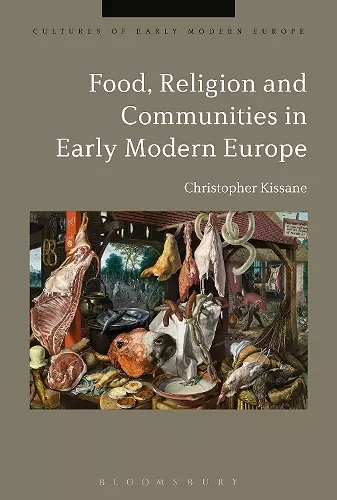Food, Religion and Communities in Early Modern Europe
Format:Paperback
Publisher:Bloomsbury Publishing PLC
Published:26th Dec '19
Currently unavailable, and unfortunately no date known when it will be back

An innovative historical study of early modern Europe which uses food as a prism to understand some of the most significant social and religious issues of the period.
Using a three-part structure focused on the major historical subjects of the Inquisition, the Reformation and witchcraft, Christopher Kissane examines the relationship between food and religion in early modern Europe. Food, Religion and Communities in Early Modern Europe employs three key case studies in Castile, Zurich and Shetland to explore what food can reveal about the wider social and cultural history of early modern communities undergoing religious upheaval. Issues of identity, gender, cultural symbolism and community relations are analysed in a number of different contexts. The book also surveys the place of food in history and argues the need for historians not only to think more about food, but also with food in order to gain novel insights into historical issues. This is an important study for food historians and anyone seeking to understand the significant issues and events in early modern Europe from a fresh perspective.
This book will be useful to researchers interested in early modern European culture, and it is written in a style that is accessible to undergraduate students, rendering it amenable for classroom use, as well. * The Historian *
[A] wide-ranging and fascinating book that succeeds in providing new perspective on familiar events in European history. One of Kissane’s key achievements is demonstrating the ways in which foods and food practices are constitutive and illustrative of religious and gender boundaries. This work is also highly readable and could easily be incorporated into undergraduate teaching. * American Historical Review *
[Provides] a compelling and readable analysis of the myriad ways in which it is near impossible to understand any aspect of human existence, lived religious beliefs included, without reference to the most fundamental of human activities: eating. * English Historical Review *
An engaging and informative book that introduces readers to the significant role of food in the social and cultural history of early modern Europe ... its greatest accomplishment is to show how food practices cast light on religion, community, and gender as they were woven into the ordinary daily activities of early modern Europeans. Its readable and engaging style will be of great value in the undergraduate classroom, while its sophistication and scope will appeal to advanced scholars. * EuropeNow Journal *
The stories in this book, with their wealth of fascinating details, illuminate, with nuance, every aspect of the societies from which they come. * Heythrop Journal *
This elegantly written, thoughtfully structured book examines food’s fundamental role in early modern religious belief, identity, and community. * Cultural and Social History *
Adds something new and very needed in European food history: more archivally researched individual cases to illuminate the great diversity of early modern European cultures. * Cultural History *
Richly researched, forcefully argued, and provides ample ‘food for thought’ ... a welcome, and highly accessible, addition to the field of early modern food studies. * Agricultural History Review *
A highly imaginative account of food, faith and society in early modern Europe. Kissane offers a refreshing comparative discussion which is never broad-brushed but richly contextualised. Students will enjoy a stimulating read which makes us think in new ways about religion and culture in the period. * Ulinka Rublack, Professor of Early Modern European History, University of Cambridge, UK *
Here is some astounding storytelling: three separate episodes from Inquisition era Castile to Reformation Zurich to a witch hunt in Shetland, all three about food and women. This book fills so many gaps in the scholarship, is so beautifully written and thought provoking that I would recommend it for any early modern history class and anyone interested in the history of food and the history of women. * Ken Albala, Professor of History, University of the Pacific, USA *
ISBN: 9781350143777
Dimensions: unknown
Weight: 345g
240 pages